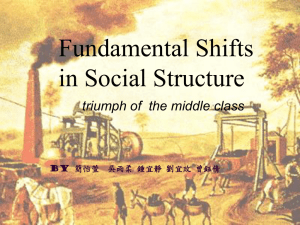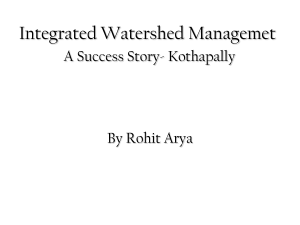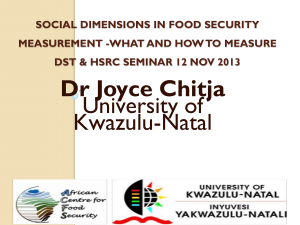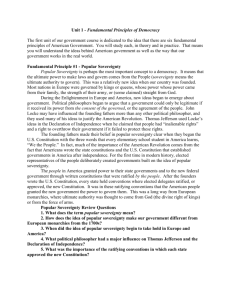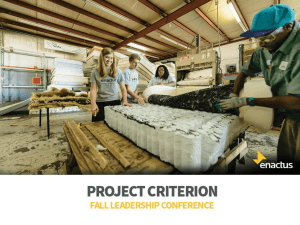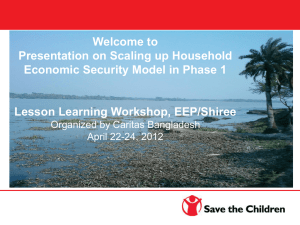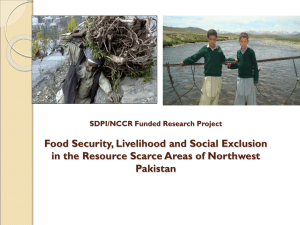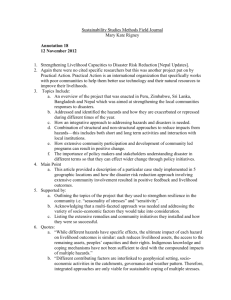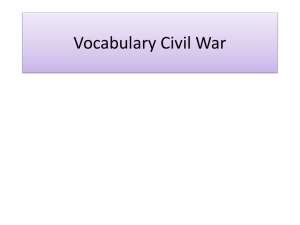- Livelihood Sovereignty
advertisement
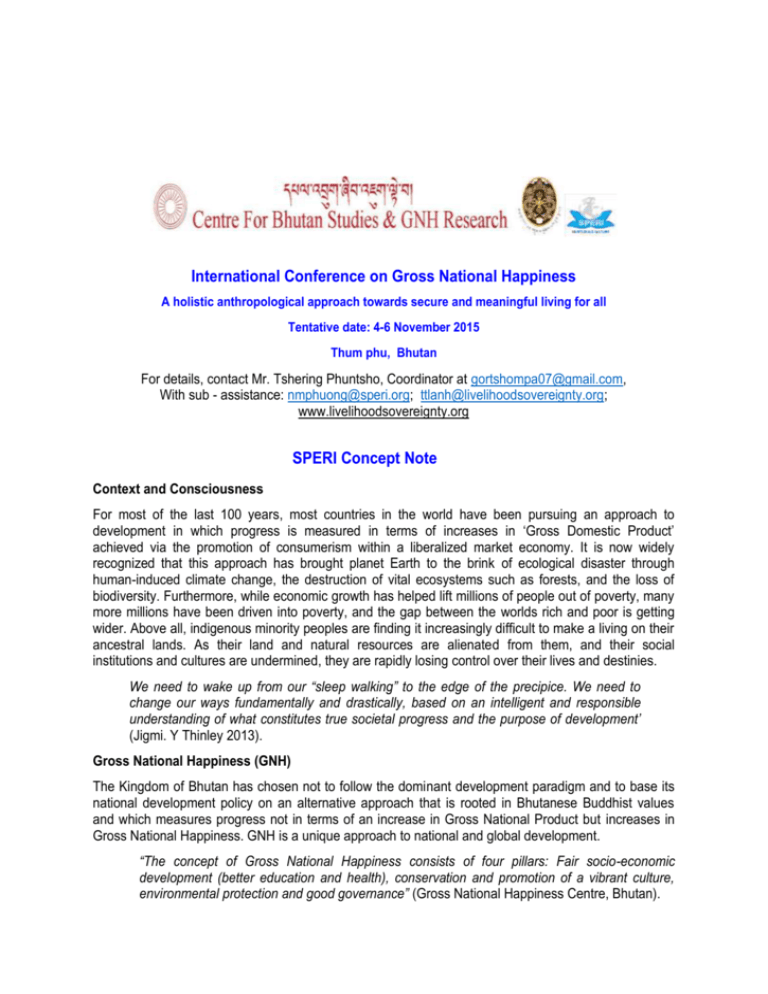
International Conference on Gross National Happiness A holistic anthropological approach towards secure and meaningful living for all Tentative date: 4-6 November 2015 Thum phu, Bhutan For details, contact Mr. Tshering Phuntsho, Coordinator at gortshompa07@gmail.com, With sub - assistance: nmphuong@speri.org; ttlanh@livelihoodsovereignty.org; www.livelihoodsovereignty.org SPERI Concept Note Context and Consciousness For most of the last 100 years, most countries in the world have been pursuing an approach to development in which progress is measured in terms of increases in ‘Gross Domestic Product’ achieved via the promotion of consumerism within a liberalized market economy. It is now widely recognized that this approach has brought planet Earth to the brink of ecological disaster through human-induced climate change, the destruction of vital ecosystems such as forests, and the loss of biodiversity. Furthermore, while economic growth has helped lift millions of people out of poverty, many more millions have been driven into poverty, and the gap between the worlds rich and poor is getting wider. Above all, indigenous minority peoples are finding it increasingly difficult to make a living on their ancestral lands. As their land and natural resources are alienated from them, and their social institutions and cultures are undermined, they are rapidly losing control over their lives and destinies. We need to wake up from our “sleep walking” to the edge of the precipice. We need to change our ways fundamentally and drastically, based on an intelligent and responsible understanding of what constitutes true societal progress and the purpose of development’ (Jigmi. Y Thinley 2013). Gross National Happiness (GNH) The Kingdom of Bhutan has chosen not to follow the dominant development paradigm and to base its national development policy on an alternative approach that is rooted in Bhutanese Buddhist values and which measures progress not in terms of an increase in Gross National Product but increases in Gross National Happiness. GNH is a unique approach to national and global development. “The concept of Gross National Happiness consists of four pillars: Fair socio-economic development (better education and health), conservation and promotion of a vibrant culture, environmental protection and good governance” (Gross National Happiness Centre, Bhutan). This approach “represents the true spirit of great institutions of learning” (Jigmi Y. Thinley 2013). It also helps maintain national sovereignty, the integrity of Bhutanese culture and identity and the natural environment on which human life depends. The Bhutanese national philosophy, strategy and daily practice of ‘Gross National Happiness’ is now becoming a source of inspiration and a model for people all over the world. Livelihood Sovereignty (LISO) In over 20 years of learning about the aspirations of indigenous minority people in the Mekong region, SPERI has come to understand their circumstances and the consequences of their losing their natural spaces of forest, land, rivers and mountains in which they have had the freedom of creating and enjoying their own well-being and happiness generation after generation for hundreds of years. From its beginning in the 1990s, SPERI staff have lived and worked with indigenous minority communities to learn the meaning of ‘well-being and happiness’ as understood by them, as practiced according to their own wisdom in their daily behavior, and as expressed in their traditional customary laws . Alongside indigenous traditional healers, spirit leaders and ordinary people, SPERI has promoted intensive networking at all levels, individually, communally and regionally. SPERI has promoted and supported bottom-up participatory learning and action, for the sharing and enriching, and the application of the norms related to the five interrelated rights of ‘Livelihood Sovereignty’ in order to empower grassroots democratization and self-determination. SPERI has identified five inter-related livelihood rights that indigenous minority people, individually and communally need to enjoy in order to have sovereignty over their livelihoods: 1) The right to land, forest and water, clean air and natural landscape (basic); 2) The right to maintain one’s own religion (unique); 3) The right to live according to one’s own way of life and values of happiness and wellbeing within one’s own natural environment (practice); 4. The right to operate according to one’s own knowledge and decide what to plant, initiate, create and invent on one’s own land; (holistic); and 5) The right to comanage or co-govern natural resources with neighboring communities and local authorities (strategic).(SPERI, 2009) ‘Livelihood Sovereignty is ‘a holistic ethical alternative solution’ that needs to be daily exercised, voluntarily and legally, at individual, communal, national and international levels in order to consolidate the sharing of the responsibility towards all living things, for today as well as for the generations of tomorrow. With the achievement of Livelihood Sovereignty, all organisms, human and non-human, will be living in harmony with each other, enjoying happiness and wellbeing, in interdependent self-determination’ (SPERI, 2009). Similar to the Bhutanese concepts of Well-Being and Happiness, the indigenous minority people in the Mekong region maintain a deep spiritual commitment to nature and cultural identity. In their worshiping of nature, and in their traditional forms of leadership, they are confident in governing their own people and preserving their natural surroundings from generation to generation by their own customary laws, balancing their material and spiritual needs without abusing either society or nature. We believe that ‘Well-being is your own gift to yourself, from your own values and behaviour. If you consciously nurture this gift, at any moment in your life, it will return to you the happiness that is yours. Thereafter, your sovereignty of freedom and creativeness will not desert you” (Tran thi Lanh 2009). Buen Vivir (Good Living - GL) During the 1990s, Latin America was subjected to neoliberal development projects that greatly increased levels of poverty and inequality, to the extent that Latin America became the most income- unequal region in the world. Then there followed the election of new, left leaning governments and the implementation of new social and economic policies. These policies were intended to improve the quality of life of the regions poor (often described as post-neoliberal).There was the revival of the role of the state in development: Social spending was increased, the state took ownership of natural resources, and there was greater redistribution of income toward the poor. As a result poverty and inequality declined markedly to the lowest level in recorded history. At the same time, the governments of Ecuador and Bolivia incorporated into their constitutions and national development plans the concept of Buen Vivir – a Spanish word meaning ‘good living’. Buen Vivir is a Spanish word used in Latin America to describe a social policy focus on ‘wellbeing’, with ‘wellbeing’ described as possible only within a community and with the concept of community extended to include Nature. There has been a very strong indigenous input into this new policy framework, with Buen Vivir being the Spanish translation of local indigenous words and concepts meaning a full life in a community of other persons and Nature. Significantly, these indigenous concepts have been incorporated into the Constitution of Ecuador in 2008 and of Bolivia in 2009 where they stand as a principle of respect for cultural diversity and harmonious coexistence with Nature. Self-Reliance (SL) The Island Pacific nation of Vanuatu has developed as a key policy platform for the government a National Self-Reliance Strategy in the areas of governance, national vision, land and land use, education, economy, social security and maintenance of culture. Among the objective of the Vanuatu National Self Reliance Strategy 2020 are the following: Full reform of the national governance system to recognize, and empower the role traditional governance in the governance of contemporary Vanuatu society Traditional resource management to become the official basis of national environmental management Traditional knowledge and custom to be incorporated as the basis for the national education curriculum The traditional economy to be recognised and promoted as a basis for national self-reliance and sustainability Statistical indicators to be developed to measure ‘wellbeing’ or quality of life For Vanuatu to officially declare itself 100% organic The production and consumption of traditional foods to be promoted The promotion traditional medicine and healing practices as an important and integral component of the national health system The significance similarities between this strategy of National Self-Reliance and those of Gross National Happiness, Livelihood Sovereignty and Buen Vivir (Good Living) Conference aims In order to promote alternative and holistic ways for human development, the conference organizers believe that existing practices and experiences need to be linked with each other and exchanges facilitated for cross-learning and mutual inspiration, reassurance and support. Thus, the idea was born to organise a sharing of ideas and experiences between indigenous minority peoples from the Mekong region and the people of Bhutan, Oceania and Latin America. The conference is aimed at building a strong connection between the Livelihood Sovereignty Alliance (LISO) of the Mekong region, The Gross National Happiness Centre of Bhutan, the Buen Vivir (good Living) initiative in Latin America, and the Self-reliance movement in Oceania, with the aim of expanding an understanding among people of the nature and linkages between different initiative throughout the world toward an alternative approach to human development for communities and nations. Thus, it seeks to contribute to bringing about changing in the understanding and attitudes of decision takers in development across the world. Objectives 1. To provide an international platform for networking between North and South to develop common values and understandings based on Gross National Happiness (GNH), Livelihood Sovereignty (LISO), Good Living (GL), and Self Reliance (SR) 2. To contribute to the existing discussions on new development paradigm to shift the wishes for development toward ‘development of the kind that would strengthen our sovereignty and give to our people the ability to pursue and fulfil their innermost yearning’ (Jigmi Y. Thinley 2013) Key Actor who will be involved: 1. Traditional elders 2. Young indigenous minority leaders ; 3. Civil society activists engaged with indigenous minority rights; 4. Intellectual activists with backgrounds in social, political and ecological anthropology and people’s rights based approaches, who are concerned with indigenous minority rights; 5. Media who focus on indigenous minority rights and for funding agencies worldwide; 6. Policy makers who have an open attitude towards alternative development approaches. Themes of concern 1. The meaning, visions, aims and application of GNH, LISO, GL, and SR: their commonalities, differences and complementarities; 2. Examples of how GNH, LISO, GL and SR have been applied in practice at the local and at higher levels, i.e. community and national levels; 3. The difficulties encountered in applying this approach; obstacles and challenges to applying these approaches more widely (i.e. at higher levels, e.g. nationally, and in other countries); the gaps that need to be addressed when applying the approach at different levels? 4. How to make GNH, LISO, GL and SR happen: the key conditions and key elements for a successful application of the GNH, LISO, GL and SR approaches? 5. Strategies for the global promotion of a re-orientation of human development in line with GNH, LISO, GL and SR approaches. Expected outcomes from the conference A new network of elders, intellectuals, civil society activists, media, and authorities will emerge for international enlarging of GNH, LISO, GL and SR; An action plan based on a joint resolution to follow up for the youth of Bhutan, the Mekong, Latin America and Oceania. A book of Conference Proceedings and a book of Case Studies on Livelihood Sovereignty and Village Wellbeing in the Mekong Region. The identification of a series of demonstration models where the performance of GNH, LISO, GL and SR in Bhutan, the Mekong, Latin America and Oceania will be opened for knowledge exchange and learning. Conceptual Framework for writing a case studies Panel 3 (iii) ‘Livelihood Sovereignty and Village Wellbeing’ for Conference in Bhutan November 4th – 6th, 2015 Livelihood Sovereignty & Livelihood Identity ‘Livelihood Sovereignty’ is conceptualized in terms of five interrelated ‘livelihood rights’ that an indigenous minority, individually and communally, or a nation-state, need to have for their well-being: 1) The right to land, forest and water, clean air and natural landscape (basic); 2) The right to maintain one’s own religion (unique); 3) The right to live according to one’s own way of life and values of happiness and wellbeing within one’s own natural environment (practice); 4. The right to operate according to one’s own knowledge and decide what to plant, initiate, create and invent on one’s own land; (holistic); and 5) The right to co-manage or co-govern natural resources with neighboring communities and local authorities (strategic).(SPERI, 2009) ‘Every ‘Livelihood’ has its own identity. ‘Livelihood identity’ defines a holistic system of social identity which reflects an interaction of living things within a relationship between human and nature for maintaining its own characteristics culturally, socio-civilly, ecologically and economically’(Tran thi Lanh 2009). Background There are three very important natural resource issues in the Mekong region: 1) land; 2) forests; and 3) water. All three are under threat of over-exploitation by national, foreign and multinational companies in alliance with national governments. Resource exploitation takes the form of mining, hydroelectric power generation and the appropriation of farm and forest lands for commercial and industrial crop production. At greatest risk in these developments are first, the millions of people whose ‘Livelihood Sovereignty’ and ‘Livelihood Identity” are dependent upon those resources in their own territories, and second, the climate, biodiversity and soil fertility of whole region. Politicians are being persuaded to accept western models of industrialization by both foreign and national companies that have much to gain from the process. The promise is that commercial resource exploitation will generate jobs, tax revenue and infrastructure development. The expectation is that large numbers of people now dependent for their livelihood on a direct relationship to the land will be removed from the land as it is taken over by large commercial enterprises. The expectation is that these displaced people will in future earn their livelihood by working for the companies and their lives will change from being independent farmers to being dependent wage workers. The reality, however, is that many will not get a job. The promise of wage employment in exchange for an independent farming livelihood will prove false as modern commercial resource exploitation, industrial agriculture, and factory production is highly mechanized and requires little labour input. The majority of former independent farmers who have to move to towns and cities to search for employment will face the disadvantage of having inappropriate skills, lack of social networks and high living costs. They will be faced with a very long and difficult period of hardship, culture loss and social disintegration. This is not the kind of development “that would strengthen our sovereignty and give to our people the ability to pursue and fulfil their innermost yearning’. (Jigmi Y.Thenley,2013). Context and Background of the case study Case studies will provide a brief historical background of the cultural history, socio-economic circumstances, and political-civil rights situation of the case study population (including maps, demography, ethnicity, religion, education etc.). They will describe existing contradictions between two different approaches to ‘livelihood’: traditional ecological agriculture and conventional agriculture/industrial farming, and how this contradiction impacts on the target group. The hottest problems being loss of land and forest by forced appropriation; flight of youth to the city; migration to wage dependency; the selling of cultural identity. Case Studies Maintaining Tradition and Wellbeing in Violack, Central Highlands of Vietnam Leadership, Governance and Sovereignty: Nurturing Nature and Wellbeing in Long Lan, Luang Prabang District, Laos. Customary Based Land Allocation: Preserving Forests and Wellbeing in On Oc, Son La Province, Northern Vietnam Livelihood Sovereignty and Wellbeing of Black Thai People in Pom Om Village, Ngae An Province, Vietnam Biodiversity Gardening and Wellbeing: The Case of Mr Phuoc Challenges and advantages analysis Challenges and advantages in moving towards the 5 rights of Livelihood Sovereignty: 1. How and to what extent has the target group been suffering from the lack of the five interrelated rights of ‘livelihood sovereignty’ 2. How has SPERI been working with the target group in order to achieve their five rights of Livelihood Sovereignty 3. What difficulties are being facing and struggling with in helping people to fight for the five rights of Livelihood Sovereignty 4. What and how has SPERI been lobbying policy makers and policy implementers in order to gain the five rights of Livelihood Sovereignty for target groups 5. How can the case study can contribute to the Conference as a strategic pointer for influencing policy making attitudes?

